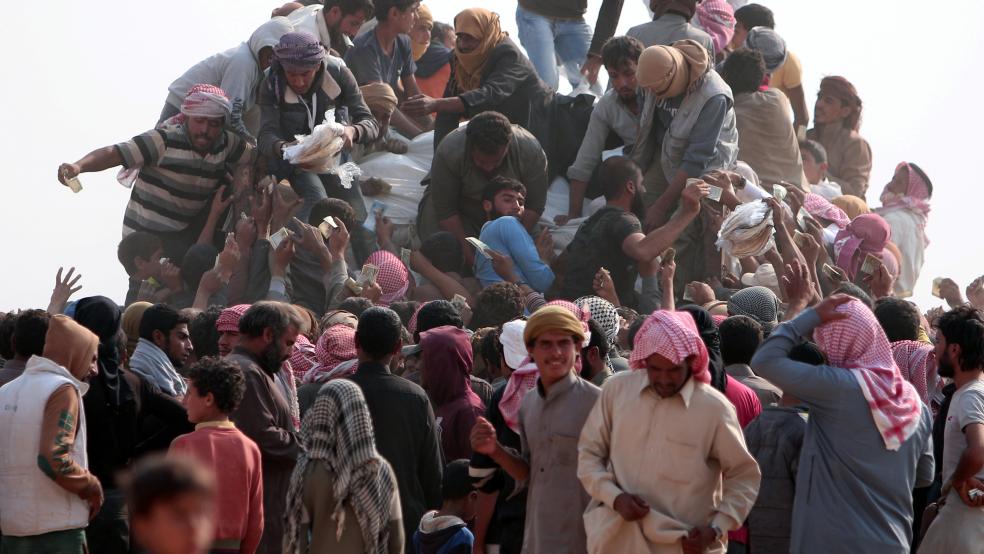We are now ten days into the Iraqi–led, U.S.–backed fight to retake Mosul, ISIS’s remaining stronghold in Iraq. Assuming a victory, will it look much different than a defeat?
The most consequential aftermath is the political, diplomatic, and battlefield mess Turkish President Recip Tayyip Erdoğan is determined to make of Mosul in the name of self-interest across the region.
Related: Has the US Backed an Incompetent Commander in Iraq?
Reports from the front lines are positive, by and large. Iraqi units are advancing on the nation’s second-largest city from several directions. Two Iraqi generals estimated Thursday that 800–900 Islamic State fighters have already been killed. Based on the Pentagon’s earlier estimates, that’s up to a third of ISIS forces inside the city.
However, the same commanders also warned that winning back Mosul could take weeks or months of heavy fighting.
That is grave news for the Obama administration for one simple reason. Anything other than a short, sharp victory will leave the White House at least partly responsible for the same kind of destruction, violence, and loss of life that the Syrian–Russian campaign wreaks daily in East Aleppo.
In such a case, it will be hard to resist comparisons between Aleppo and Mosul despite incessant criticism, including charges of war crimes, against Syrian forces and the Russian bombers supporting it.
Related: Factbox: Once-Tolerant Mosul Site of Iraq Push Against Islamic State
The bitter lesson Obama’s policy planners should not have had to learn is this: Whether Americans or Iraqis are leading the fight, any battle for a city of a million or more is fated to be protracted, and what’s left afterward will inevitably reflect tragic human and material losses.
So much for the Obama Doctrine. The White House also did not figure on what it means to make local forces lead, which is the core goal of the president’s new strategy. Elliot Ackerman, a former Marine now reporting for Esquire, described the prevalence of sectarian militias when interviewed from the front lines on NPR Wednesday.
“From the back of their Humvees they’re flying these Shi’a flags as they go toward Mosul,” Ackerman said. “These are supposedly nonsectarian forces that aren’t supposed to be participating in sectarian violence.”
Grim reality No. 2: Defeating ISIS in Mosul—and by extension Iraq—isn’t going to make much difference if it means replacing Sunni extremists with their Shi’a adversaries.
The Obama Doctrine’s most serious indictment—and the grimmest reality now facing the White House—arises from Erdoğan’s arrogant insistence that Turkish units must be part of the Mosul campaign. In a phrase, the Turkish leader now makes his nation the local ally from hell.
Nobody wants the Turkish army to play any such role—not Baghdad, and certainly not U.S.–backed Kurdish forces, whose effectiveness on the battlefield proves decisive in Iraq and Syria alike.
Related: Turkey, Iraq Reach Agreement 'In Principle' on Mosul
The Sunni-nationalist leader signaled his intentions two years ago when Turkey stationed a garrison of troops equipped with tanks and artillery in northern Iraq over Baghdad’s strenuous objections. As forces gathered for the Mosul campaign earlier this month, the Turkish parliament voted to extend the mandate for a year—a pointed provocation that set the stage for the multi-sided mess now unfolding.
Erdoğan has since asserted that “Turkey cannot be left off the table”—again over Baghdad’s protests. He elaborated by stating that only Sunnis should remain in Mosul after it is recaptured.
There we have it: Sectarianism as official policy—this from a key American ally in the region.
Erdoğan’s obsession with crushing Kurdish minorities in Turkey, Syria, and Iraq is well-enough known—and problem enough for Washington, given its military reliance on Kurdish forces. Now he is asserting grandiosely that the Ottoman Empire’s legacy gives Turkey “a historic role in the region” well beyond its borders.
Related: Iraq's Traumatized Minorities: A Test of Unity After Mosul Offensive
The Sykes–Picot maps, which divided the Ottoman Empire into modern Syria and Iraq after World War I, may need to be redrawn before this is all over, but Recip Tayyip Erdoğan’s nostalgia for lost greatness cannot be accepted as the guiding principle.
The Obama administration’s responses to Erdoğan’s ever more stunning assertions have been inadequate to choose the mildest term for it.
Last week Defense Secretary Ashton Carter announced after meetings with Turkish officials that Baghdad and Ankara had reached “an agreement in principle” allowing Turkey a role in the Mosul campaign. A Pentagon official subsequently explained that Turkey could make nonmilitary contributions such as humanitarian assistance and medical aid.
Iraqi leaders immediately and unambiguously stated that no such agreement existed, in principle or otherwise. Pretending a chasm this wide and deep isn’t there is one definition of “inadequate.”
Related: Turkey's Erdogan Says Iraq Cannot Handle Mosul Assault Alone
Carter compounded matters when he addressed Erdoğan’s hyper-nationalist ambitions. As The New York Times put it, “Mr. Carter has said the United States is trying to balance ‘our respect for the sovereignty of Iraq’ and ‘our respect also for Turkey’s historic role in the region.’”
What? Iraq’s rights under international law do not “balance” with an unpredictable dictator’s irredentist dreams of imperial revival.
Mosul has pushed the Obama administration into an all-too-familiar bind, as Secretary Carter’s misguided remarks make plain: It will do anything at this point to mollify a wildly undisciplined leader who should be treated to just the opposite. Never mind the Middle East as another quagmire for the Russians: The outgoing president has made it ours.






